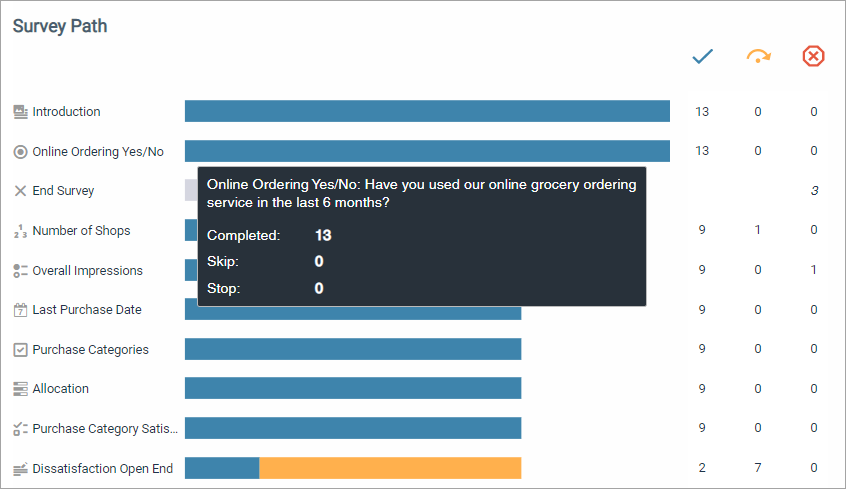Survey participation
Monitor participation statistics while your survey is open to participants.
The survey participation report offers insight into how your survey is doing in field. It's a good idea to check the survey participation report's numbers after a soft launch, and periodically while the survey is open. Unexpected results could indicate potential problems, which you can then troubleshoot before they become more serious.
| Example |
|---|
An unusually high number of participants stop your online shopping survey when they reach the Customer Satisfaction question. When you review your survey, you notice that the question text for Customer Satisfaction is very long, which may discourage participants from continuing the survey. You shorten the question text, re-distribute the updated survey, and monitor the participation report to see if stop rates improve. |
To access the survey participation report, open the Surveys app and then open the survey you are interested in reporting on. On the activity toolbar, click the Monitor tab.
You will see a topline view of live participation data which includes all distribution methods.
Survey Summary
The Survey Summary displays a breakdown of overall participation statuses in a bar chart, along with counts for each status.

The following table provides calculation definitions for each of the statuses in the Survey Summary.
| Status | Definition |
|---|---|
| Started |
The number of times participants started the survey. |
| Completed |
The number of times participants completed the survey. |
| Disqualified |
The number of times participants were terminated because they did not meet the criteria to continue. |
| Over Quota |
The number of times participants were terminated because enough participants completed the survey:
This count excludes participants who skipped a question because the quota for the question was met, and then proceeded through the rest of the survey. These participants would be recorded with a status of Completed or Disqualified depending on how the rest of the survey goes. |
Median Time to Complete
The Median Time to Complete represents how much time (in minutes and seconds) participants in the middle needed to complete the survey. Half of the participants required more time, while the other half required less. Median Time to Complete can be a more accurate measure of how long your survey is than the average time to complete as averages can be distorted by extremely high or low outlying values.
Survey Path
The Survey Path section shows how many participants completed, skipped, or stopped at certain questions and survey elements. Hover over the question labels or bars to view the Completed, Skip, and Stop counts and the question text. The counts also appear in columns to the right of the bar chart.
You can use the information in the Survey Path section to diagnose survey logic problems in specific places. For example, a question that has higher than anticipated incomplete and stop rates may warrant investigation.

The following table explains the calculation definitions for the Completed, Skip, and Stop counts.
| Question status | Definition |
|---|---|
|
Completed 
|
The number of times participants saw the question and
clicked
Next to proceed.
Note: For optional questions, the Completed count also
includes participants who saw the question and chose not to provide an answer.
|
|
Skip 
|
The number of times participants did not see the question. |
|
Stop 
|
The number of times participants stopped the survey when they saw the question. Tip: Pay close attention to stop rates. For
example, a high stop rate at a termination point is expected, while a high stop
rate at a question may indicate drop offs and therefore a cause for concern.
|
- RespondentLocale: Indicates the language the participant used to respond to the survey.
- DisplayType: Indicates whether the participant used a desktop or mobile device to respond to the survey.
- UserAgent: Provides information about the browser the participant used to participate in the survey.
To view the data, add the questions to your survey report, and export the report as a CSV file. For more information, see Add or remove profile variables in the report and Export a report to CSV.
